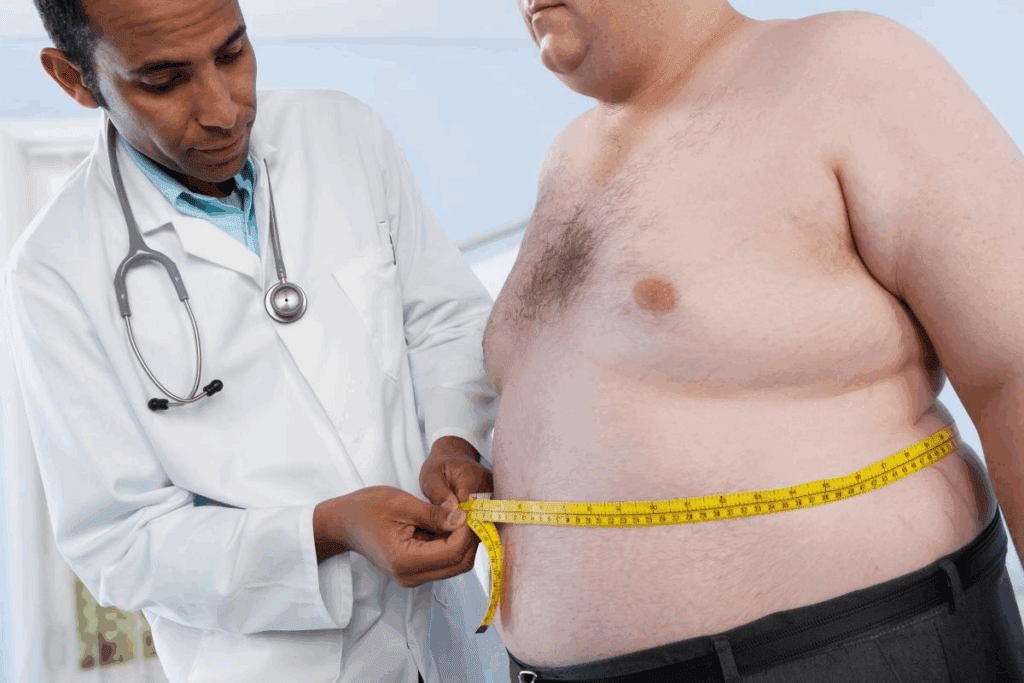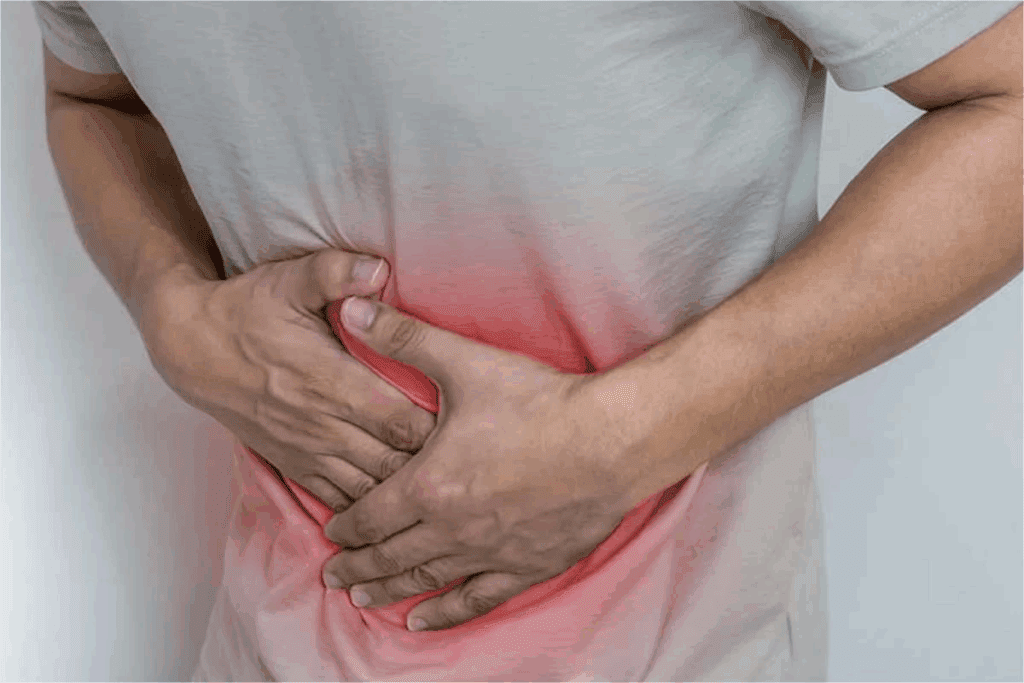Last Updated on November 26, 2025 by Bilal Hasdemir

Many patients worry about weight gain after gallbladder removal. Liv Hospital focuses on patient care and sheds light on this issue. Studies show that cholecystectomy itself doesn’t directly cause weight gain. But, changes in diet, metabolism, and digestion might lead to weight gain after surgery.
The link between gallbladder removal and weight changes is complex.can gallbladder removal cause weight gainWhy Am I Gaining Weight So Fast? Child Causes It’s important to understand what affects weight gain after cholecystectomy. This knowledge helps in managing weight effectively.

The gallbladder is a small, pear-shaped organ under the liver. It stores and concentrates bile, a digestive fluid. This organ is key for digesting and absorbing fats.
The gallbladder mainly stores bile, made by the liver. Bile goes into the small intestine to break down fats. This makes fats easier for the body to absorb.
Bile salts help dissolve fats. This makes fats easier for enzymes to break down. The gallbladder’s role is vital for digesting fats, which is important for vitamin absorption.
The liver makes about one liter of bile daily. This bile goes to the gallbladder through ducts. The gallbladder then stores and concentrates it, releasing it into the small intestine after meals.
| Organ | Function | Role in Bile Production/Storage |
| Liver | Produces bile | Produces approximately 1 liter of bile daily |
| Gallbladder | Stores and concentrates bile | Stores and releases bile into the small intestine |
| Small Intestine | Site of fat digestion and absorption | Receives bile from the gallbladder for fat emulsification |
Bile production, storage, and release are complex processes. They are vital for fat digestion. Knowing how the gallbladder works helps us understand its role in digestion and health.

Removing the gallbladder can lead to weight changes, studies show. It’s important to know this to help patients prepare and manage their health after surgery.
Many people notice weight changes after their gallbladder is removed. Some gain weight, while others lose it. These changes come from how the body adapts and changes in eating habits.
Some might eat more after surgery, which can cause weight gain. Others might find they can eat more foods without pain, leading to weight loss.
Research on this topic is mixed. Some studies link gallbladder removal to weight gain, while others find no link. How well the body adapts to not having a gallbladder is a big factor.
The liver keeps making bile, which helps digest fats. But without the gallbladder, bile release patterns can change. This might affect how well the body absorbs nutrients.
| Study | Findings | Sample Size |
| Study A | Significant weight gain observed in patients post-cholecystectomy | 100 |
| Study B | No significant weight change observed | 200 |
| Study C | Variable outcomes; some patients gained weight, while others lost weight | 300 |
It’s key to understand the difference between short-term and long-term weight changes. Short-term changes are often due to recovery and new eating habits. Long-term changes show how the body adapts to life without a gallbladder.
Insulin resistance and inflammation can also play a role in weight changes after surgery. Eating right and staying active can help manage these factors.
Patients should be aware of these possible weight changes. Talking to their doctor about their risk factors is important. This way, they can manage their weight and health better after surgery.
Removing the gallbladder can change how we digest food and manage weight. The body’s way of handling bile changes, affecting fat digestion.
Without a gallbladder, the liver makes bile but it goes straight to the small intestine. This makes digesting fats less efficient. People might find it harder to digest fatty foods.
Bile flow changes can affect the gut’s bacteria balance. Bile salts help keep gut bacteria healthy. Changes in bile flow can upset this balance, affecting gut health and metabolism.
Removing the gallbladder can also change how digestive hormones are released. The lack of a gallbladder might alter signals for hormones like cholecystokinin (CCK). This hormone helps us feel full and control digestion.
The table below shows the main changes after gallbladder removal and their effects:
| Physiological Change | Potential Effect |
| Altered Bile Flow | Less efficient fat digestion |
| Impact on Gut Microbiome | Changes in gut bacteria balance |
| Changes in Digestive Hormones | Altered satiety signaling and digestive regulation |
It’s important to understand these changes to manage weight and health after gallbladder removal. Making smart food choices and living a healthy lifestyle can help.
The link between gallbladder removal and weight gain is a topic of debate. Some people see big changes in their weight after surgery. Others don’t, which raises questions about why.
Many studies have looked into weight changes after gallbladder removal. A study in the Journal of Gastrointestinal Surgery found a big weight gain in the first year. On average, people gained 5.4 kg (11.9 lbs) (1).
Another study in the Journal of Clinical Gastroenterology found that 70% of patients gained weight. The average gain was 3.5 kg (7.7 lbs) (2).
But not all studies agree. A review in HPB Surgery found mixed results. Some studies showed weight gain, while others found no change or even weight loss (3).
Understanding the link between gallbladder removal and weight gain is tricky. It’s important to look at other factors that might affect weight. These include diet, exercise, and metabolic conditions.
“The gut microbiome plays a key role in metabolic health. Changes in it can lead to obesity and metabolic disorders.”
Nature Reviews Microbiology
Research shows that an imbalance in the gut microbiome is linked to more visceral fat and insulin resistance (4). This imbalance after surgery might lead to weight gain in some people.
People react differently to gallbladder removal. Factors like metabolic conditions, diet, and lifestyle play a big role. A study in the Journal of the Academy of Nutrition and Dietetics found that a low-fat diet after surgery can help avoid weight gain (5).
| Factor | Influence on Weight Gain |
| Dietary Habits | A low-fat diet may reduce the risk of weight gain |
| Gut Microbiome | Dysbiosis may contribute to weight gain and metabolic issues |
| Physical Activity | Regular exercise can help mitigate weight gain |
In conclusion, there’s evidence that gallbladder removal can lead to weight gain. But the relationship is complex, influenced by many factors. More research is needed to understand the mechanisms and find ways to manage weight changes after surgery.
After gallbladder removal, patients often see changes in how their body handles food and nutrients. These changes can lead to weight gain.
Insulin resistance is a big factor. It makes the body’s cells less responsive to insulin. This can cause poor blood sugar control and fat storage, leading to weight gain.
Studies show that cholecystectomy can worsen glucose metabolism. This can make insulin resistance worse.
Many patients become less active after surgery. This can make insulin resistance and weight gain worse. It’s important to start moving again slowly.
Inflammation is another key factor after surgery. Without a gallbladder, the gut microbiota changes. This can lead to bad bacteria growth and inflammation.
Chronic inflammation can mess with metabolism. It can change how fat is stored and distributed. This can lead to weight gain, mainly in the belly, which is risky for metabolic disorders.
The gallbladder’s removal changes fat absorption. Without it, bile goes straight to the small intestine. This can make fat digestion and absorption different. The body might store more fat because it’s less efficient at processing fats.
| Metabolic Change | Effect on Weight | Potential Long-term Impact |
| Insulin Resistance | Increased fat storage | Higher risk of type 2 diabetes |
| Increased Inflammation | Changes in fat distribution | Metabolic syndrome |
| Altered Fat Absorption | Potential weight gain | Nutritional deficiencies |
It’s key to understand these metabolic changes after gallbladder surgery. By making dietary changes, being more active, and changing lifestyle, patients can manage their weight better. This can also lower the risk of metabolic problems.
Having your gallbladder removed can change how you eat and behave. Without a gallbladder, your body can’t store and release bile the same way. This might affect how you digest food and absorb nutrients.
After surgery, many people feel better when they eat. They might eat more because they’re not in pain anymore. This can lead to eating bigger meals or more often, which can cause weight gain.
Some people can eat anything they want after their gallbladder is gone. But this freedom can sometimes lead to eating too much of high-calorie foods.
After surgery, some foods might be easier to eat, while others might bother you. You might start craving foods like bread, sweets, or rice. These foods can make your insulin levels go up and help your body store fat.
Eating after surgery can also be influenced by your mind. You might eat more because you’re happy or stressed. This can lead to choosing foods that are high in calories and fat, which can make you gain weight.
It’s important to understand these changes to manage your weight after gallbladder surgery. Knowing how your body and mind might react can help you make better food choices. This way, you can stay healthy and feel good.
Extreme weight gain after gallbladder surgery is common. Several factors contribute to this. Knowing these factors helps manage weight after surgery.
Some people are more likely to gain a lot of weight after gallbladder surgery. These include:
People’s bodies react differently to gallbladder removal. Factors influencing this response include:
Pre-existing health conditions can greatly affect weight gain after gallbladder surgery. For instance:
Understanding these risk factors and individual variations helps manage weight post-surgery. It’s important to work closely with healthcare providers to develop a personalized plan.
After gallbladder surgery, it’s key to follow the right diet to manage weight. Without a gallbladder, the body changes how it handles fats, affecting weight.
Without a gallbladder, the body must learn to digest fats differently. Starting with medium-chain triglycerides (MCTs) like coconut oil or MCT oil is helpful. These fats are easier to digest and offer energy.
Later, you can add healthy fats like olive oil, avocado, and nuts in small amounts. This slow introduction helps your body get used to digesting fats without the gallbladder’s help.
Good meal planning is vital after gallbladder removal. Eating smaller, more frequent meals can ease digestion and reduce symptoms. Make sure each meal has protein, healthy fats, and complex carbs.
Some foods are easier to digest after gallbladder removal, while others may not be. Foods high in fiber, like fruits and veggies, are good. Lean proteins are also beneficial. But, high-fat foods, like fried foods, can be hard to digest.
| Food Category | Recommended Foods | Foods to Limit |
| Fats | MCT oil, olive oil, avocado | Fried foods, high-fat dairy |
| Proteins | Lean meats, fish, eggs | Processed meats |
| Carbohydrates | Whole grains, fruits, vegetables | Refined grains, sugary snacks |
Some people might find supplements helpful after gallbladder removal. Bile salts aid in fat digestion, and probiotics support gut health. But, always talk to a healthcare provider before starting any supplements.
Managing weight after gallbladder surgery needs a mix of exercise and lifestyle changes. Even small surgeries require rest, and exercise routines may be disrupted. It can take time for patients to get back to their usual activities.
After gallbladder surgery, patients can benefit from different exercises. These help manage weight and improve health. Some good exercises include:
| Exercise Type | Benefits | Frequency |
| Aerobic | Improves cardiovascular health, burns calories | 3-4 times a week |
| Resistance Training | Builds muscle mass, aids in weight management | 2-3 times a week |
| Flexibility and Balance | Enhances flexibility, reduces injury risk | 2-3 times a week |
Creating lasting lifestyle habits is key for managing weight long-term. This includes:
Managing stress and getting good sleep are important for weight management. Techniques like meditation, deep breathing, or yoga can help reduce stress. Also, aiming for 7-8 hours of sleep per night can help with weight regulation.
To see if these lifestyle changes are working, tracking progress is key. This can be done through:
Understanding your body’s new needs without a gallbladder is key. If you’re dealing with unexplained weight gain or health issues, start by being aware. This awareness is the first step towards a better life.
Managing weight after surgery means making smart food choices and staying active. By doing so, you can control weight changes and keep your health in check. It’s all about making the right moves in your diet and exercise routine.
Being aware of how your body changes after surgery is important. Changes like altered bile flow and digestive hormones can affect your weight and health. With the right knowledge and strategies, you can manage your weight and live well after gallbladder removal.
Gaining weight after gallbladder removal is possible. But it’s not a sure thing. Weight changes can happen due to digestion, diet, and lifestyle shifts.
The link between gallbladder removal and weight gain is complex. Some studies suggest a connection, but it’s hard to say for sure. How people react to surgery varies a lot.
Metabolic changes like insulin resistance and inflammation can lead to weight gain. These changes affect how the body handles fat.
To manage weight, focus on good nutrition and meal planning. Avoid certain foods and include exercise in your routine. Sustainable habits and stress management are also key.
Yes, dietary changes can help with digestion after gallbladder removal. Eat smaller meals, avoid fatty foods, and choose easy-to-digest foods.
Supplements like bile salts or digestive enzymes might help with digestion. But, always talk to a healthcare professional before starting any supplements.
To avoid extreme weight gain, live a healthy lifestyle. Eat well and exercise regularly. Stress management and enough sleep also help with weight control.
Yes, conditions like insulin resistance can impact weight gain after gallbladder removal. Managing these conditions through lifestyle and treatment can help control weight.
Losing weight after gallbladder removal is possible. Focus on a healthy diet, exercise, and sustainable habits. This can lead to weight loss and better health.
Subscribe to our e-newsletter to stay informed about the latest innovations in the world of health and exclusive offers!